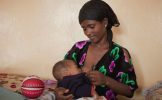As World Breastfeeding Week kicks off this year, the African Development Bank calls on African countries to push breastfeeding as a means to give children a vital head start to their future wellbeing.
“A prosperous and well-nourished Africa that protects, promotes and supports breastfeeding during the first 1,000 days of a child’s life will provide potential for children in Africa to grow, learn and earn in the future,” said Oley Dibba-Wadda, Bank’s Director of Human Capital, Youth and Skills Department.
World Breastfeeding Week is celebrated every year from August 1-7 to improve the health of babies around the world. This year’s theme is Breastfeeding: the Foundation of Life.
Through the African Leaders for Nutrition initiative (ALN), the Bank is engaging Heads of State and eminent leaders as nutrition champions. The ALN was launched and endorsed by African Heads of State during the African Union Summit in January 2018 in Addis Ababa Ethiopia.
ALN is currently working to increase domestic resources allocated to nutrition to support interventions that protect and promote breastfeeding. It is developing a continental nutrition accountability scorecard and an economic case for nutrition reports.
These will serve as advocacy tools to encourage political leadership and accountability to achieve nutrition targets set out in the Malabo declaration and World Health Assembly.
There are considerable variations in the results for key breastfeeding indicators across African countries and regions, according to UNICEF.
The prevalence of exclusive breastfeeding in the first 6 months is higher in East and Southern Africa (56%) than in West and Central Africa (33%) and in the North Africa/Middle East region (32%). The overall prevalence of exclusive breastfeeding in Sub-Saharan Africa stands at 43%, which is below the minimum target of 50% recommended by the World Health Assembly.
Breastfeeding should remain a priority in Sub-Saharan Africa, with renewed emphasis on early initiation of breastfeeding, in addition to exclusive breastfeeding in the first 6 months and continued breastfeeding up to 2 years or beyond.

